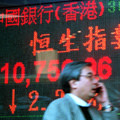Hanergy secured $200m loan ahead of solar group stock tumble

Simply sign up to the Energy sector myFT Digest -- delivered directly to your inbox.
Li Hejun, the solar tycoon and controlling shareholder in Hanergy Thin Film Power Group, took a US$200m loan pledging millions of shares in the Hong Kong listed company as collateral just two days before its share price crashed last week, dethroning him as China’s richest man.
The loan is the latest in a series of corporate loans involving British Virgin Island entities owned by HTF’s parent Hanergy Group, a Financial Times investigation has found. Through its BVI transactions, Hanergy pledged billions of shares in HTF — the world’s largest solar company — as the stock soared.
The Hanergy companies and Mr Li have come under intense scrutiny as HTF grew at breakneck speed in recent months, propelling its market value to at least five times more than its nearest competitor, First Solar of the US. Until last week, HTF was valued at more than Tesla and Twitter.
Mr Li has rejected concerns about its sustainability and said the company will revolutionise solar energy. But analysts have questioned HTF’s business model, which largely depends on sales of its solar equipment to its parent. They have also questioned some of its unconventional financial practices.
The offshore filings unearthed by the FT show Hanergy Group, owned by Mr Li, has used the listed company to help raise multiple loans. They also reveal further complicated financial arrangements between HTF and Hanergy, its major shareholder and largest customer.
They show that Hanergy Group was acquiring loans in a way that made HTF’s strong share price pivotal. HTF’s financial health is highly reliant on Hanergy Group.
While HTF has built its business using low levels of corporate debt, many of its bills for equipment sold to Hanergy have not yet been paid. The privately held Hanergy Group has made use of high interest shadow banking loans to fund its operations, an earlier FT investigation found.

HTF shares were suspended on Wednesday after the share price plunged 47 per cent during morning trading.
Two days earlier, a Hanergy subsidiary in the British Virgin Islands guaranteed a US$200m loan from Chinese state owned investment manager China Huarong Asset Management, pledging 795m shares, which at the time were worth HK$5.8bn (US$747m). Last Wednesday’s crash reduced the value of the collateral to nearly half of that.
Hanergy did not respond to FT questions on why Hanergy took the loan. China Huarong — which is known for helping to stabilise banks’ balance sheets by taking their troubled exposures — could not be reached for comment. It is unclear whether the lender has asked for more HTF shares to be pledged since the crash.
The Chinese business magazine, Caixin, reported on Thursday that people close to Hanergy said the mainland group failed to repay loans by financial institutions, causing shares held as collateral to be sold off.
Hanergy then released a statement to reject media reports over what triggered the sell-off: “Our group’s operations are normal in all respects and we maintain a good financial position with no overdue loans. There was no forced liquidation of the group shares as cited in some media reports as the cause of the price plunge of the shares of Hanergy Thin Film Power Group Limited.”
It also said: “Our Group has full confidence in the development of Hanergy Thin Film Power Group Limited.”
Hanergy pledged HTF shares to at least three different lenders in the past 18 months, including one known as Sheen Vision Holdings that is incorporated in the BVI, filings show. During that time period HTF’s share price increased by 500 per cent.
The pledged shares appear in the filings of Hanergy Investment, China Genco Investment and GL Wind Farm Investments, three BVI-registered investment companies that are owned by Hanergy. Pledging shares as collateral is not illegal and Mr Li declared his pledges in Hong Kong filings. Details of the loans and lenders were not included in Hong Kong filings.
The BVI filings show that there are additional loans through related-party companies that could mask the real exposure that the HTF stock could have to loan defaults, unless investors were fully aware of all the conditions of the loan.
In one case, loan conditions stipulated that the HTF share price should not fall below a certain value. According to the BVI filing, the loan arrangement with Sheen Vision Holding, incorporated just months earlier, required that the value of the 1.44bn HTF shares pledged had to be more than HK$1.74bn (US$224.7m) before Hanergy Investment could draw on the loan.
That meant the share price could go no lower than HK$1.21 — what it was selling for in August 2014. By April it had soared to HK$7.88, before plunging to HK$3.91 on Wednesday. Typically, loans using shares as collateral contain clauses that allow the lender to request more collateral or to sell the shares in the open market if the share price falls below a preset level.
The filings show Hanergy Investment also pledged HTF shares to China Development Bank to back a loan made in 2011 to a Hanergy solar project on the mainland. More funding was arranged with a lender represented by the Chinese brokerage, Haitong Securities. In December 2014, another BVI entity, China Genco, pledged nearly 1bn HTF shares as collateral for funds from China Huarong.
Pledging shares as collateral is lawful but needs to be disclosed, said Michael Cheng, research director for China and Hong Kong at the Asian Corporate Governance Association in Hong Kong. Mr Cheng did not discuss Hanergy’s loans but he noted share pledging as common in the region.
Controlling shareholders in Hong Kong sometimes delay disclosing their pledges or skirt disclosure transparency rules. This is a risk to minority investors in the case of sudden price moves when a margin call is triggered.
In recent weeks Mr Li — who holds a net position in HTF of 73 per cent of the shares — continued to buy shares in the company, which at one point was valued at $40bn.
The BVI corporate filings also reveal other details about Hanergy’s financial practices.
FT investigation of Hanergy

Hanergy: The 10-minute trade
FT investigation of two years of trading data of Hanergy Thin Film stock shows that shares consistently surged late in the day, about 10 minutes before the exchange’s close.
Breakneck growth raises questions
The breakneck growth of Hanergy Group has helped to make its founder one of China’s richest men.
FT View: Hanergy’s soaring share price raises questions
Hong Kong authorities need to satisfy themselves on the solar group.
Li taps shadow lenders
An FT investigation has found that Hanergy Group has borrowed billions of renminbi through high-interest Chinese “trust products” marketed to wealthy individuals.
In mid January 2014, the filings show, Mr Li — through Hanergy Investment — pledged “at least” 1.4bn shares in HTF to an unspecified lender represented by a subsidiary of Haitong Securities (China’s second-biggest securities company by assets).
The next day, Hanergy Investment bought nearly 50m shares in HTF for HK$60m, at a price per share of HK$1.202, according to an announcement by the listed company.
The share pledge was released in July 2014. On 14 August, Hanergy Investment pledged 1.44bn shares in HTF to Sheen Vision.
That same day, Mr Li filed a disclosure to the Hong Kong stock exchange that he had a “short” position in HTF of 1.44bn shares — which at the time amounted to 5 per cent of the company — and a 72.92 per cent “long position”.
Share pledges are often only disclosed to the Hong Kong stock market through a disclosure-of-interest filing — but with no detail on the lender or loan arrangement.
A pledge of shares is regarded as a change in the nature of interest in the shares. In Hong Kong filings, share pledges can appear as a shareholder’s “short” position, with a reference code to alert investors that the position may refer to share pledges rather than shorting of stock. Investors holding short positions borrow shares and sell them, betting that the share price will drop so they can reap a profit.
Mr Li’s most recent disclosure-of-interest filing dated two days before the share price plunged shows his “short” position climbed to 7.71 per cent, with a “long” position of 80.79 per cent.
Attempts to contact Sheen Vision via its registered agent in BVI were unsuccessful. The identity of the beneficiaries of Sheen Vision Holdings is not publicly available.
Hanergy has previously faced questions about how pledged shares were used. HTF trading was suspended in December 2013, a day after a Hong Kong newspaper alleged that shares pledged to lenders had been transferred to hedge funds for short selling.
In an announcement to the Hong Kong stock exchange, HTF confirmed at the time that Hanergy Group had pledged one-third of its 17bn HTF shares to four unnamed financial companies in exchange for loans worth HK$520m.
The company said then that most of the HK$345m drawn down was used to buy HTF shares.
Additional reporting: Lucy Hornby and Miles Johnson



Comments